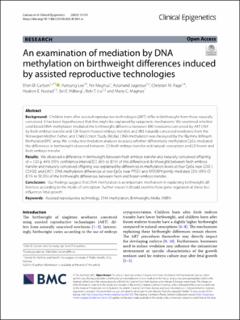An examination of mediation by DNA methylation on birthweight differences induced by assisted reproductive technologies
Carlsen, Ellen Øen; Lee, Yunsung; Magnus, Per Minor; Jugessur, Astanand; Page, Christian Magnus; Nustad, Haakon Egdetveit; Håberg, Siri Eldevik; Lie, Rolv Terje; Magnus, Maria Christine
Journal article, Peer reviewed
Published version

Åpne
Permanent lenke
https://hdl.handle.net/11250/3039374Utgivelsesdato
2022Metadata
Vis full innførselSamlinger
Sammendrag
Background
Children born after assisted reproductive technologies (ART) differ in birthweight from those naturally conceived. It has been hypothesized that this might be explained by epigenetic mechanisms. We examined whether cord blood DNA methylation mediated the birthweight difference between 890 newborns conceived by ART (764 by fresh embryo transfer and 126 frozen thawed embryo transfer) and 983 naturally conceived newborns from the Norwegian Mother, Father, and Child Cohort Study (MoBa). DNA methylation was measured by the Illumina Infinium MethylationEPIC array. We conducted mediation analyses to assess whether differentially methylated CpGs mediated the differences in birthweight observed between: (1) fresh embryo transfer and natural conception and (2) frozen and fresh embryo transfer.
Results
We observed a difference in birthweight between fresh embryo transfer and naturally conceived offspring of − 120 g. 44% (95% confidence interval [CI] 26% to 81%) of this difference in birthweight between fresh embryo transfer and naturally conceived offspring was explained by differences in methylation levels at four CpGs near LOXL1, CDH20, and DRC1. DNA methylation differences at two CpGs near PTGS1 and RASGRP4 jointly mediated 22% (95% CI 8.1% to 50.3%) of the birthweight differences between fresh and frozen embryo transfer.
Conclusion
Our findings suggest that DNA methylation is an important mechanism in explaining birthweight differences according to the mode of conception. Further research should examine how gene regulation at these loci influences fetal growth.
